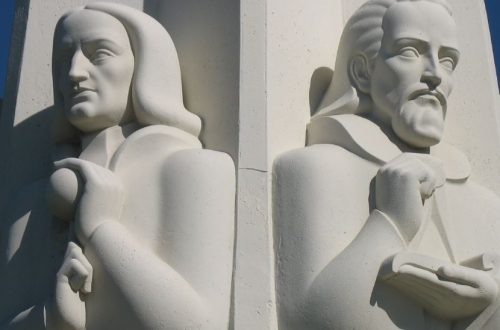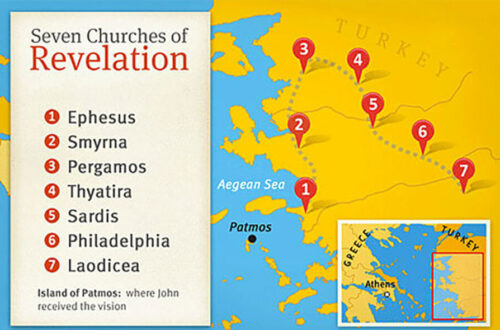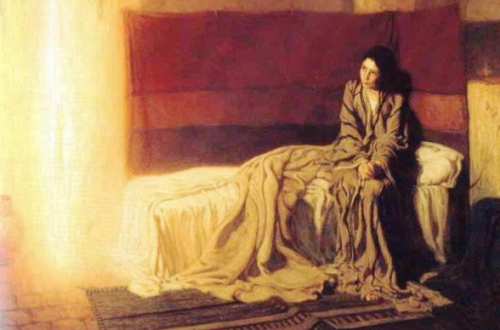Declaring God’s glory
Psalm 96:1–13 is part of the lectionary readings for the twentieth Sunday after Pentecost, which is October 18th. This ode is a royal hymn that celebrates God’s universal reign.
The song seems to have been composed for use in public worship, most likely in the Jerusalem temple. The fact that it is quoted almost entirely in 1 Chronicles 16 points to its Davidic character and origin. The Septuagint version of the hymn also links it to him.
The historical context included David bringing the ark of the covenant back to Jerusalem to unite the religious and political life of the nation. Specifically, Uzzah and Ahio, the sons of Abinadab, set the ark on a new cart and guided it.
When the oxen pulling the cart stumbled, Uzzah used his hand to steady the ark. God struck him dead at the site because he showed disrespect for a sacred object of the Lord. Then David decided to place the ark in the house of Obed–Edom for three months (chap. 13).
Next, the king brought the ark to Jerusalem. David showed special homage by sacrificing a burnt offering. Israel’s monarch celebrated by dancing passionately before the Lord.
David’s wife, Michal, privately criticized him for his unrestrained expression of joy. Yet, despite his wife’s contempt, David continued to celebrate and offered up a prayer of thanks (chaps. 15–16).
In David’s ode of praise, all of earth’s inhabitants are summoned to declare a “new song” (Ps 96:1). As with 33:3, we are reminded that the Lord is the Redeemer of His people and the just Ruler of the planet (96:10).
Because the Creator establishes life, protects the upright, and promotes equity, everyone in all places are invited to extol Him in fresh, innovative ways. The exuberance of the passage suggests that the adoration could not be restrained or held back.
Indeed, how could the participants keep quiet in light of God’s great “salvation” (or “deliverance”; v. 2)? In a universal chorus, they were to kneel in homage as they praised His “name.”
In ancient Semitic culture, a person’s name was more than a mere designation. It disclosed significant information about that individual’s character. Likewise, the names for God in Scripture reveal key truths about Him.
The Lord’s ability to save His people from times of distress was one important aspect of His character. The psalmist even directed that God’s acts of deliverance be announced day after day, especially to those who did not know Him.
In David’s mind, Israel was to be God’s witness to the surrounding idolatrous, pagan nations (v. 3). Specifically, the chosen people had the privilege of testifying to their neighbors about the Lord’s glorious deeds and wondrous acts.
First Peter 2:10 reveals that God has given believers today a similar responsibility. When we truly understand the greatness of our Redeemer and the salvation He freely offers us through faith in the Messiah, we cannot help but become witnesses to His wonderful work in our lives (Matt 28:16–20).
In stepping back from Psalm 96:1–3, we recognize the songwriter describing people whose excitement in worshiping the Lord spills over into witnessing about Him. It seems natural that those who spend time reciting God’s greatness should relate that same message to unbelievers.
Additionally, enthusiasm in worship is itself a witness to the lost concerning the Creator we adore. The Spirit can prompt them to ask why God’s people are so excited!
The primary consideration behind the poet’s call to sing God’s praise is His surpassing greatness (v. 4). No other so-called god or goddess venerated by Israel’s pagan neighbors could be compared to the awesomeness of the Lord.
The Creator was to be revered above all territorial or national deities. As Deuteronomy 6:4 reveals, He alone is the one and only true God.
In Psalm 96:5, the Hebrew noun for “idols” draws attention to the nothingness and worthlessness of these pagan deities. In contrast to the Lord, who created the entire universe, all heathen idols were powerless and lifeless. It was He who controlled these impotent entities, not the other way around.
During the Old Testament era, the idolatrous world considered the “heavens” to be the dwelling place of their deities. The fact that the Lord made this celestial abode emphasizes His supreme authority over these supposed gods and goddesses. Compared with the one, true, and living God, these idols were a mere trifle.
Verse 6 describes the Creator’s glory in a poetic way. For instance, the pairs of divine qualities—“splendor and majesty” coupled with “strength and beauty”—are portrayed as an entourage of attendants serving the Lord within His heavenly court. What pagan god or goddess could ever match the royal power and radiance of Israel’s God?
The second half of Isaiah’s prophecy contains many passages contrasting the magnificence of the Creator with the worthlessness of idols (for example, 40:18–20; 44:9–20; 46:5–7). Isaiah 46:9 sums up the superiority of the Lord in contrast to the pagan deities venerated by the surrounding nations. He declared that He alone is God, and no other entity throughout the cosmos rivaled Him.
Isaiah 42:17 shows the future despair of people who placed their hope in idols cast from metal. They would experience utter disgrace for their folly.
Contrast the preceding fate with the singing that accompanies the uprights’ realization of the Lord’s salvation. Only the true God can bring such joy to the hearts of His people.
The Creator’s infinite superiority to any alleged deity prompted the hymnist to invite the kingdoms of the earth to join him in worshiping the one, true, and living God. Just as the planet’s inhabitants were summoned to affirm the Lord’s provision of salvation (Ps 96:2–3), so too the countries of the world were to recognize the boundless extent of His “glory and power” (v. 7; see 29:1–2).
Even in the Old Testament, God wanted all the nations to hear about His honor and might. In turn, they were to respond by worshiping only Him. In this regard, Israel was to bear witness to God’s unique authority and power (Isa 43:10, 12).
Here we see that God’s sovereignty is not limited to just one race, continent, or hemisphere. His rule touches every realm, making all humanity accountable to Him.
In ancient times, acts of worship and gestures of tribute were usually expressed with a sacrifice. As Psalm 96:8 indicates, the Israelites were also required to bring a variety of food and grain offerings into the temple courts to express their gratitude to God and signal their desire to fellowship with Him.
Verse 9 is more expansive in summoning people from across the globe to bow down in worship before the splendor of their Creator at His majestic temple. It’s also possible that verse 9 refers to participants coming before the Lord in garments that give appropriate recognition to His awe–inspiring holiness.
The above view suggests more than donning proper worship attire. Colossians 3:12 indicates that believers are to clothe their attitudes and actions with a garment of holiness.
In one sense, we can never be holy enough to stand before the Father apart from the righteousness we possess by faith in baptismal union with the Son. Because of what Jesus did on the cross, believers are dressed in His righteousness.
Yet, in another sense, the glory of God reminds believers to approach Him by showing appropriate reverence. In this way, they confirm that they worship a mighty and holy Creator.
Psalm 96:10 records the thematic statement of the song (93:1; 97:1; 99:1), namely, that the Creator reigns supreme over the entire universe. Perhaps the poet was attentive to the injustice around him and longed for an era of justice.
Both the competency and fairness of God’s rule stand out in Psalm 96:10. There is a note of joy in knowing that He has established the world on a firm foundation. In short, God is in control over all chaotic forces and oversees the affairs of humankind in an objective, equitable manner.
Verses 11 and 12 personify all creation as joining in the chorus of praise to the Lord (1 Chron 16:31; Ps 148:7; Isa 44:23; 55:12). Whether it is the heavens and the earth, or the seas and the land (with its fields and forests), every entity across the globe is called upon to thunder their joyous praise.
Every aspect of creation is especially excited to celebrate the King’s arrival to govern the world in a morally upright and equitable manner. Indeed, every decision He makes is characterized by integrity (Pss 82:8; 94:1–3; 98:9).
The references in the Psalter to God’s reign have been interpreted in various ways. Some think that the focus is on the universal rule of the Creator over nature.
Others take the reign literally but limit it to Israel. Still others conclude that the emphasis is on the Messiah’s thousand-year kingdom. In this case, the psalms are said to be prophetic, pointing mainly to a future time.
During the Old Testament era, the upright remnant affirmed that the Lord of history reigned supreme. They also looked with anticipation for the coming of the Redeemer, who would eliminate iniquity and inaugurate His just kingdom upon the earth.
However bleak the future appeared, there was tremendous security in knowing that the Creator would one day punish the wicked and vindicate the righteous. Such a hope in so great a God was cause for His people to shout out a “new song” (96:1).
Key ideas to contemplate
Psalm 96 reveals that worship is not something that happens in isolation, nor is it simply a matter of being caught up in a spirit of contagious enthusiasm. Proper adoration comes when believers unite to rejoice in God’s unique authority and glory.
1. Excitement in worship. The poet describes people whose excitement in worshiping the Lord spills over into witnessing about Him. It seems natural that those who spend time recounting God’s greatness should relate the same message to unbelievers.
Additionally, enthusiasm in worship is a witness to others concerning the kind of God believers worship. The unsaved want to know why believers are excited.
2. God’s supreme rule. While believers today might not be tempted to worship idols made from metal, stone, and wood, they do struggle with giving the things of the world (such as the acquisition of power, fame, and fortune) undue priority. Just as with the Israelites in David’s day, contemporary believers need to be brought back to reality by acknowledging the supreme rule of God over their lives.
3. God’s sovereign provision. One way believers can honor God is by giving Him the credit for all their talents, resources, and accomplishments. This necessitates them recognizing their dependence on the Lord for the strength they need to serve others unconditionally. So, rather than believers’ boasting about their abilities, they point others to the Creator as the One who made them what they are.
4. God’s just rule. In this world it seems as though the wicked prosper, while the righteous suffer the consequences. Yet, a consistent theme of Scripture is that eventually evildoers will pay for their atrocities, while the upright will be eternally rewarded. The fact that God will one day set things right encourages believers to persevere in their faith.



